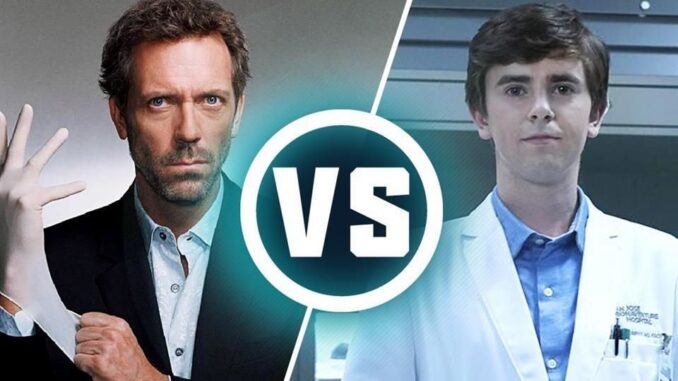
In the vast world of medical dramas, few characters have left a mark as enduring as Dr. Gregory House from House M.D. and Dr. Shaun Murphy from The Good Doctor. Both are brilliant diagnosticians. Both challenge the traditional hospital system. Both captivate audiences with their intellect. And yet, the similarities mostly end there. While House operates with cynicism and sarcasm, Shaun leads with innocence and integrity. Their contrasting personalities, approaches to medicine, and emotional journeys make them fascinating figures to compare — not as rivals, but as two reflections of genius under pressure.
Let’s explore what truly sets these two doctors apart — and why each remains iconic in their own right. Dr. Gregory House, played masterfully by Hugh Laurie, is infamous for his brutal honesty, biting sarcasm, and disdain for social niceties. He doesn’t sugarcoat, doesn’t trust patients, and often pushes everyone around him to the edge of their tolerance. House’s misanthropy is both a defense mechanism and a defining trait. To him, people lie, emotions cloud judgment, and only logic and deduction matter.
On the other hand, Dr. Shaun Murphy (Freddie Highmore) is pure-hearted and deeply empathetic, even if he struggles with communication. As a young surgical resident with autism and savant syndrome, Shaun’s worldview is literal and unfiltered — but never cruel. Where House uses his words like a scalpel, Shaun speaks with awkward sincerity. His intentions are never malicious. He wants to heal not just bodies, but people.
While House pushes people away, Shaun draws them in — not because he tries to, but because his honesty is rooted in genuine care. Shaun may lack social finesse, but his emotional growth is constant and deeply moving. The professional core of both characters lies in their genius. House is a diagnostician — the kind of doctor who solves medical puzzles others can’t. He’s obsessed with finding answers, even if it means breaking rules or bending ethics. His mantra, “Everybody lies,” underscores his belief that only he can get to the truth.
Shaun, on the other hand, is a surgeon — gifted with exceptional visual memory and pattern recognition. He doesn’t just solve problems; he sees them. Literally. The show often visualizes Shaun’s mind at work, showing anatomical diagrams, tissue structures, and surgical plans as they appear in his head. His savant abilities allow him to conceptualize complicated procedures in real-time, often saving lives others can’t.

While House thrives in intellectual chaos, Shaun thrives in structure and procedure. Both save lives in unconventional ways — but their styles couldn’t be more different. House rarely played the role of mentor in the traditional sense. He led a diagnostic team, but his version of “teaching” often involved manipulation, emotional tests, and pushing his staff to uncomfortable extremes. It was effective, but never nurturing. House believed that pressure revealed truth — even if it hurt. Shaun, in contrast, begins as a mentee, learning from Dr. Glassman and the surgical team. But over time, especially in later seasons, he begins mentoring junior residents. His method is kind, direct, and supportive. He challenges those under him not through mind games, but through shared effort and honesty. He sees their potential and wants them to succeed — not to prove his superiority, but to build community.
One of the most defining contrasts between these two characters lies in their emotional arcs. Dr. House’s story is ultimately a tragedy. His brilliance isolates him. His addiction to painkillers — combined with his refusal to trust or love — leads to the slow erosion of his humanity. He sabotages relationships, buries trauma, and rarely allows himself true happiness. Even moments of vulnerability are fleeting. Shaun, conversely, represents hope. His story is one of growth, connection, and learning to navigate a world that doesn’t always understand him. He starts as an outsider, but he builds relationships — with colleagues, friends, and a romantic partner. He learns not just how to be a surgeon, but how to be emotionally present. His arc is inspiring precisely because it’s so human.
House’s portrayal of genius came at a time when TV was dominated by anti-heroes. He was in the same era as Breaking Bad’s Walter White and Mad Men’s Don Draper — brilliant but morally ambiguous men who fought their demons while breaking rules. Shaun, however, represents a shift in modern television. He is a neurodivergent character at the center of a primetime network show — something rarely seen, especially in a lead role. His autism is not a gimmick; it’s a central part of his identity, treated with care, complexity, and depth.
Freddie Highmore’s portrayal has sparked important conversations about representation and neurodiversity in media. While no character can represent an entire spectrum, Shaun has become a symbol of possibility, strength, and the right to be different. Comparing House and Shaun isn’t about choosing who is “better.” It’s about examining two drastically different approaches to life, medicine, and morality. House makes you think. Shaun makes you feel. House questions the world. Shaun embraces it. Both reflect aspects of the medical profession that are real, raw, and relevant.
In a world of formulas and clichés, these two characters shattered expectations — each in their own time. Dr. Shaun Murphy and Dr. Gregory House will go down as two of television’s most iconic doctors — not just because of their brilliance, but because of how they forced viewers to confront uncomfortable truths. House made us question authority and empathy. Shaun made us believe in the power of patience, persistence, and quiet courage.
